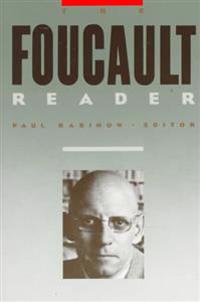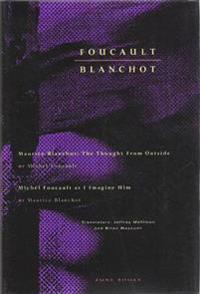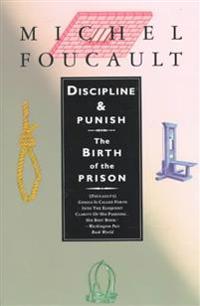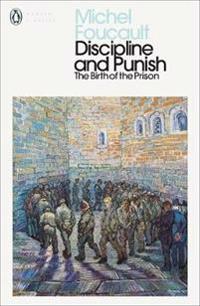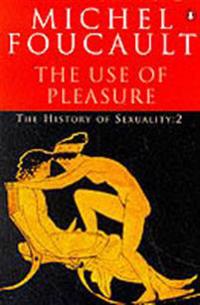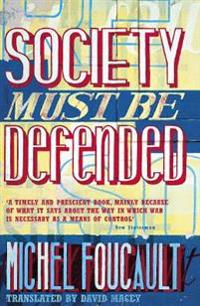The Foucault Reader (Storpocket)
avMichel Foucault
ISBN: 9780140124866 - UTGIVEN: 199103This is an introduction to Foucault's thought, which includes some previously unpublished material.
The Foucault Reader (Pocket)
avMichel Foucault
ISBN: 9780394713403 - UTGIVEN: 198412Michel Foucault was one of the most influential thinkers in the contemporary world, someone whose work has affected the teaching of half a dozen disciplines ranging from literary criticism to the history of criminology. But of his many books, not one offers a satisfactory introduction to the entire [...]
Foucault, Blanchot (Häftad)
avMichel Foucault, Maurice Blanchot
ISBN: 9780942299038 - UTGIVEN: 199001Essays by two prominent French writers analyze each other's writings and intellectual works
Aesthetics, Method, and Epistemology: Essential Works of Foucault, 1954-1984 (Häftad)
avMichel Foucault, James D. Faubion
ISBN: 9781565845589 - UTGIVEN: 199909Foucault Live (Häftad)
avMichel Foucault
ISBN: 9781570270185 - UTGIVEN: 199601Currently in its fourth printing, Foucault Live is the most accessible and exhaustive introduction to Foucault's thought to date. Composed of every extant interview made by Foucault from the mid-60s until his death in 1984, Foucault Live sheds new light on the philosopher's ideas about friendship, t[...]
The Chomsky - Foucault Debate: On Human Nature (Häftad)
avNoam Chomsky, Michel Foucault, John Rajchman
ISBN: 9781595581341 - UTGIVEN: 200609Religion and Culture (Pocket)
avMichel Foucault, Jeremy R. (EDT) Carrette, Michel Foucault
ISBN: 9780415923620 - UTGIVEN: 1999-06First Published in 1999. Routledge is an imprint of Taylor & Francis, an informa company.
Discipline and Punish (Pocket)
avMichel Foucault, Alan Sheridan, Michel Foucault
ISBN: 9780679752554 - UTGIVEN: 199505In this brilliant work, the most influential philosopher since Sartre suggests that such vaunted reforms as the abolition of torture and the emergence of the modern penitentiary have merely shifted the focus of punishment from the prisoner's body to his soul.[...]
Foucault Beyond Foucault
ISBN: 9780804757027 - UTGIVEN: 2007-11In Foucault Beyond Foucault Jeffrey Nealon argues that critics have too hastily abandoned Foucault's mid-career reflections on power, and offers a revisionist reading of the philosopher's middle and later works. Retracing power's "intensification" in Foucault, Nealon argues that forms of political p[...]
Foucault (häftad)
ISBN: 9780007292226 - UTGIVEN: 2008-06By attempting a highly original merger of philosophy and history, Michel Foucault set out to revitalize philosophical reflection through several provocative analyses of the Western past.[...]
Madness: The Invention of an Idea (Häftad)
avMichel Foucault
ISBN: 9780062007186 - UTGIVEN: 201101Compelling and highly influential, Michel Foucault's Madness is an indispensable work for readers who wish to understand the intellectual evolution of one of the most important social theorists of the twentieth century.Written in 1954 and revised in 1962, Madness delineates the profound shift that o[...]
Foucault's Pendulum (Storpocket)
avUmberto Eco
ISBN: 9780099287155 - UTGIVEN: 200106Three book editors, jaded by reading far too many crackpot manuscripts on the mystic and the occult, are inspired by an extraordinary conspiracy story told to them by a strange colonel to have some fun. They start feeding random bits of information into a powerful computer capable of inventing conne[...]
Discipline and Punish (Storpocket)
avMichel Foucault
ISBN: 9780140137224 - UTGIVEN: 199104Foucault shows the development of the Western system of prisons, police organizations, administrative and legal hierarchies for social control - and the growth of disciplinary society as a whole.
Reissue.[...]The History of Sexuality (Storpocket)
avMichel Foucault
ISBN: 9780140137347 - UTGIVEN: 199209This book offers an account of the emergence of Christianity from the Ancient World. Here Foucault describes the stranger byways of Greek medicine (with its advice on the healthiest season for sex as well as on exercise and diet), the permitted ways of courting young boys, and the economists' ideas [...]
The History of Sexuality (Storpocket)
avMichel Foucault
ISBN: 9780140137354 - UTGIVEN: 199005This is the third volume of Foucault's "History of Sexuality". A sociologist and historian of ideas, Foucault's other works include "Madness and Civilization", "The Archaeology of Knowledge", "The Birth of the Clinic" and "Discipline and Punish".[...]
Ethics (Storpocket)
avMichel Foucault
ISBN: 9780140259544 - UTGIVEN: 200003This is the first of three volumes collecting the most significant writings and interviews of Michel Foucault outside his published monographs. "Ethics" contains Foucault's summaries of the highly influential courses he taught at the College de Francefrom 1970 to 1982 (hitherto never translated into[...]
Aesthetics, Method, and Epistemology (Storpocket)
avMichel Foucault
ISBN: 9780140259568 - UTGIVEN: 200003"Aesthetics" is the second in a three-volume, definitive collection of Michel Foucault's articles, interviews and seminars. It focuses primarily upon the philosophy, literature and other works of the imagination which have informed Foucault's particular engagement with ethics and power and includes [...]
Power (Storpocket)
avMichel Foucault
ISBN: 9780140259575 - UTGIVEN: 200201This book covers the topics Foucault helped make the core agenda of Western political culture - medicine, prisons, psychiatry, government and sexuality - emphasising Foucault's practical concern with discrimination, coercion and exclusion in human society.[...]
The History of Sexuality (Storpocket)
avMichel Foucault
ISBN: 9780140268683 - UTGIVEN: 199810Why has there been such an explosion of discussion about sex in the west since the 17th century? Here, one of France's greatest intellectuals explores the evolving social, economic and political forces that have shaped our attitudes to sex. In a book that is at once controversial and seductive, Fouc[...]
Society Must be Defended (Storpocket)
avMichel Foucault
ISBN: 9780140270860 - UTGIVEN: 200410SOCIETY MUST BE DEFENDED is a full transcript of the lectures given by Foucault at the College de France in 1975-76. The main theme of the lectures is the contention that war can be used to analyse power relations. Foucault contends that politics isa continuation of war by other means. Thus, any con[...]
The Spectacle of the Scaffold (Pocket)
avMichel Foucault
ISBN: 9780141036649 - UTGIVEN: 200808Foucault's writings on power and control in social institutions have made him one of the modern era's most influential thinkers. Here he argues that punishment has gone from being mere spectacle to becoming an instrument of systematic domination over individuals in society - not just of our bodies, [...]
Foucault's Pendulum (Inbunden)
avUmberto Eco
ISBN: 9780151327652 - UTGIVEN: 198911"As brilliant and quirky as THE NAME OF THE ROSE, as mischievous and wide-raning....A virtuoso performance."
THE SAN FRANCISCO CHRONICLE
Three clever book editors, inspired by an extraordinary fable they heard years befoe, decide to have a little fun. Randomly feeding esoteric [...]Foucault's Pendulum (Häftad)
avUmberto Eco
ISBN: 9780156032971 - UTGIVEN: 200703Bored with their work, three Milanese editors cook up "the Plan," a hoax that connects the medieval Knights Templar with other occult groups from ancient to modern times. This produces a map indicating the geographical point from which all the powers of the earth can be controlled--a point located i[...]
Foucault: A Very Short Introduction
ISBN: 9780191578045 - UTGIVEN: 2015-06Foucault is one of those rare philosophers who has become a cult figure. Born in 1926 in France, over the course of his life he dabbled in drugs, politics, and the Paris SM scene, all whilst striving to understand the deep concepts of identity, knowledge, and power. From aesthetics to the penal syst[...]
Foucault (Häftad)
avGary Gutting
ISBN: 9780192805577 - UTGIVEN: 200503Foucault is one of those rare philosophers who has become a cult figure. Born in 1926 in France, over the course of his life he dabbled in drugs, politics, and the Paris SM scene, all whilst striving to understand the deep concepts of identity, knowledge, and power. From aesthetics to the penal syst[...]


